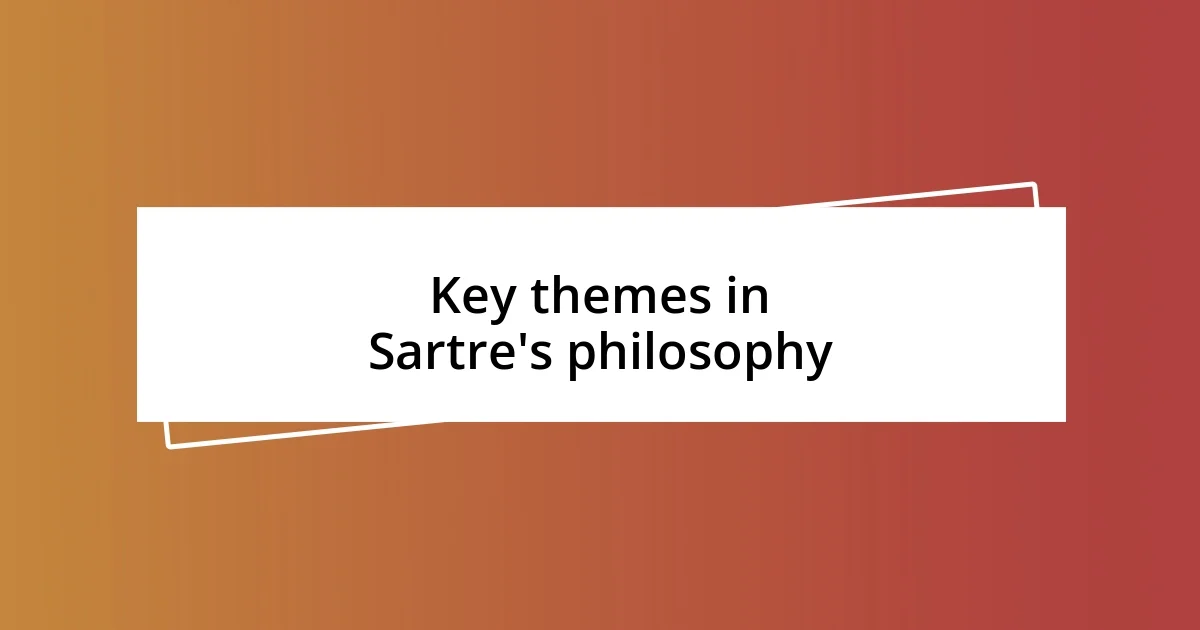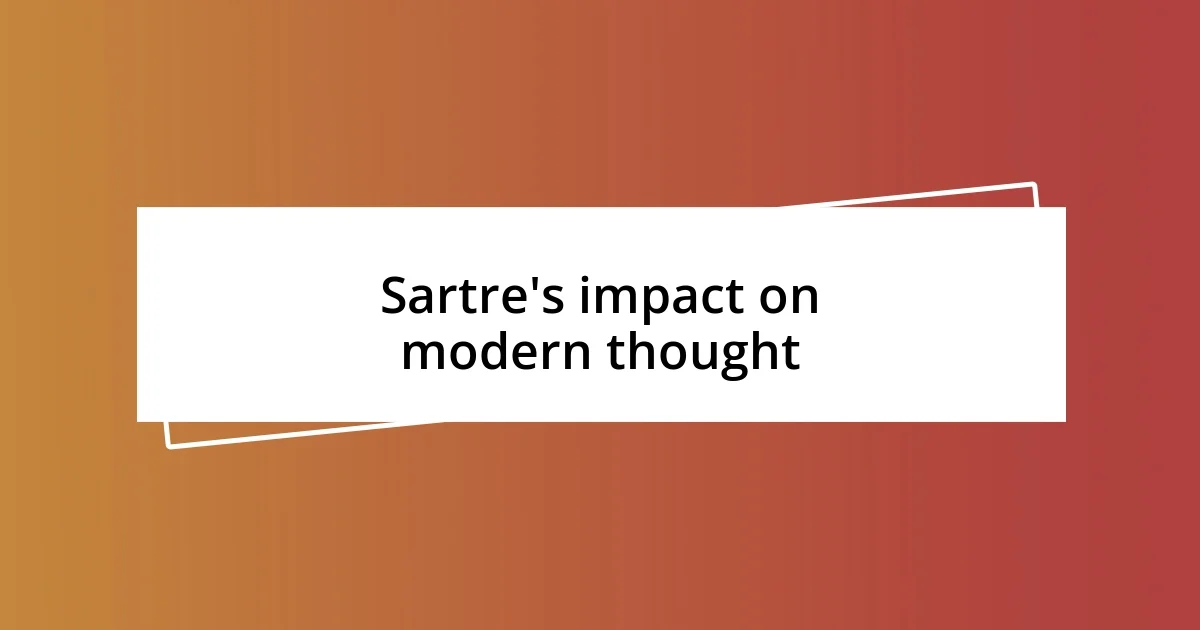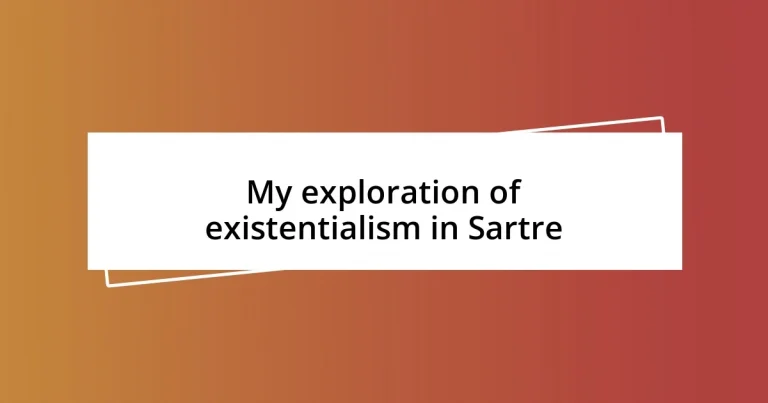Key takeaways:
- Sartre’s principle of “existence precedes essence” emphasizes individual freedom and responsibility, encouraging people to define their own meaning in life through choices.
- Key themes in Sartre’s philosophy, such as “bad faith,” “being-for-itself vs. being-in-itself,” and absurdity, highlight the complexities of human experience and the importance of embracing authenticity.
- Sartre’s influence spans philosophy, literature, and political theory, challenging societal norms and fostering discourse on individualism and collective responsibility, relevant to modern discussions on social justice.

Understanding existentialism principles
One of the fundamental principles of existentialism, especially in Sartre’s philosophy, is the idea that existence precedes essence. This means we aren’t born with a predetermined purpose; instead, we create our own meaning through choices and actions. I remember grappling with this concept during my college years when I felt overwhelmed by societal expectations. It dawned on me—if I’m the author of my life, then my choices define me.
Another significant aspect is the emphasis on individual freedom and responsibility. Sartre argued that we are free to make our own decisions, but this freedom comes with the weight of responsibility for those choices. Reflecting on moments when I hesitated to take a leap of faith in my career, I often wondered: isn’t it easier to blame external factors? Yet, embracing that freedom meant accepting the consequences of my choices, whether they led to success or failure.
Existentialism also encourages us to confront the absurdity of life. The realization that life often feels random and chaotic can be daunting, but it also opens the door to authentic living. I recall a particularly challenging period when I faced setbacks that seemed pointless, and I found relief in understanding that it was okay not to have all the answers. Isn’t it liberating to consider that sometimes, the struggle itself holds the key to clarity?

Sartre’s biography and influences
Jean-Paul Sartre, born in 1905 in Paris, was profoundly influenced by his experiences and the tumultuous times in which he lived. His academic pursuits led him to philosophy and literature, with a particular focus on existential thought. For me, it’s fascinating to see how the world events of his youth, including the rise of fascism and World War II, deeply impacted his writings and worldview. As Sartre began to question the purpose of existence and the nature of freedom, he cultivated a philosophy that urged individuals to embrace their inherent freedom and responsibility.
Here are some key influences that shaped Sartre’s thinking:
- Philosophical Background: Influenced by Hegel and Nietzsche, he grappled with ideas of existence and individualism.
- Personal Experiences: His time as a soldier during World War II led to reflections on human freedom under oppression.
- Literary Contributions: The works of Dostoevsky, especially in exploring moral dilemmas, greatly impacted his literary style.
- Existentialism and Marxism: His integration of existentialism with Marxism showed the intersection of personal freedom and social responsibility.
These influences are critical in understanding why Sartre’s philosophy resonates with so many, including myself, as it reflects the nuanced struggle of finding meaning in a complex and often chaotic world.

Key themes in Sartre’s philosophy
Existentialism in Sartre’s philosophy revolves around several key themes that unravel the complexities of human experience. One prominent theme is “bad faith,” which I’ve come to understand as the act of deceiving oneself to escape the burden of freedom. I remember the discomfort of avoiding tough decisions in relationships, convincing myself that inaction was safer. However, it was through confronting those feelings that I realized embracing authenticity requires acknowledging my true desires and choices, even when they’re challenging.
Another essential theme is the idea of “being-for-itself” versus “being-in-itself.” The former refers to conscious beings who can reflect, change, and create meaning, while the latter refers to the existence of objects that simply are. I find this distinction incredibly liberating. It assures me that, unlike a rock, I have the power to shape my life. This realization fosters a sense of agency in my daily choices; it transforms mundane decisions into profound acts of creation. Have you ever felt that rush when you finally make a decision that reflects who you truly are?
The theme of absurdity plays a crucial role in Sartre’s thought, urging us to find our own meaning in a chaotic world. There have been moments when I felt overwhelmed by life’s unpredictability, like during a job search that seemed to go nowhere. Yet, embracing the absurdity helped me see that meaning isn’t handed to us; it’s crafted through our responses to life’s unpredictability. In many ways, the absurdity of life has become a canvas for me to paint my own narrative, illustrating that within chaos, we can find clarity and purpose.
| Theme | Description |
|---|---|
| Bad Faith | Self-deception to avoid responsibility for one’s actions and choices. |
| Being-for-Itself vs. Being-in-Itself | Distinction between conscious beings who create meaning and objects that exist without it. |
| Absurdity | The notion that life is chaotic, encouraging individuals to find their own significance. |

Sartre’s impact on modern thought
Sartre’s impact on modern thought can be felt across various fields, especially in philosophy, literature, and political theory. His advocacy for radical freedom challenged people, including myself, to reconsider how much responsibility we bear for our lives. Have you ever pondered whether you truly own your choices or if they’re dictated by societal norms? That introspection has been eye-opening for me.
In literature, Sartre’s existential themes revolutionized character development, steering writers towards more complex portrayals of humanity. When I read his plays, I noticed how characters grapple with their choices and the consequences thereof. It prompted me to appreciate the layers of ambiguity in the human experience—nothing is ever purely good or evil. I questioned how often I, too, have placed labels on others without recognizing their struggles.
Moreover, his integration of existentialism with Marxist thought catalyzed social discourse around individualism and collective responsibility. This blend resonates deeply in today’s discussions on social justice and equality. Reflecting on my experiences in activism, I’ve seen how understanding both personal and societal dimensions of freedom can lead to more impactful change. It’s a powerful reminder that our struggles, both individually and collectively, shape the landscape of human existence.













